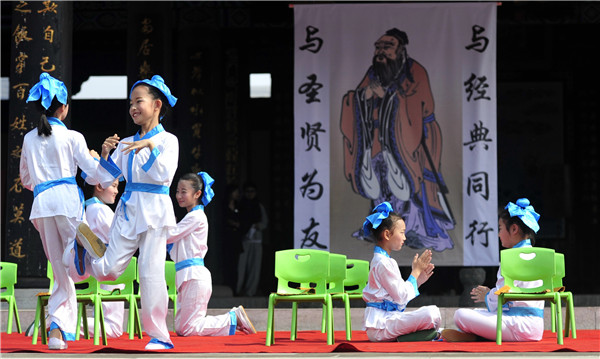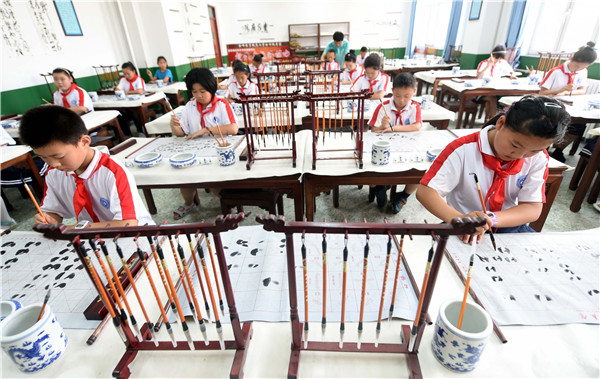
Ancient classics provide lessons that are still relevant today
Dressed in the style of the Han Dynasty that ruled China 1,800 years ago, 6-year-old Chen Quanjin is chanting ancient Chinese classics with several other children about the same age as their heads sway from side to side.
Instead of taking piano lessons or joining an overseas study tour, Chen spent his summer vacation doing traditional Chinese studies at the Chengxian Guoxue Institute in Guozijian, China's highest education institute from the 13th to 19th centuries.
Chen has mastered the Dizigui, a Chinese book dating back more than 300 years that lays out standards for being a good child and student. He says the three-character verses are understandable and trip off the tongue.
"Older siblings should befriend younger ones; younger siblings should respect and love older ones. Siblings who keep harmonious relationships among themselves are being dutiful to their parents," Chen quotes from the work.
With students aged mostly from 4 to 10, the Chengxian Guoxue Institute aims to expand children's exposure to traditional culture through introductions to Confucianism, Chinese calligraphy and other traditional values, says director Ji Jiejing.
"Traditional Chinese culture should not lose its grip on young Chinese as it is good for their moral development and the cultivation of their character. Some wisdom delivered through the Chinese classics might help children deal with the challenges in their own lives," Ji says.
 |
|
Ancient classics provide lessons that are still relevant today. [Photo by Liu Junxi Xinhua / China Features] |
"As a kind of enlightenment, I think traditional Chinese learning can start at an early age, say around 4, so the philosophy will be deeply rooted in their hearts."
The popularity of the Chengxian Guoxue Institute reflects a resurgence of interest in traditional culture. In recent years, Chinese students' English learning craze has, to some extent, led to the neglect of their mother tongue, especially China's traditional cultural legacy. So there has been a pressing call for a school system that attaches enough importance to the learning of traditional culture.
Beijing's Tongzhou district is a pioneer in teaching traditional culture. More than 50 primary and middle schools there have compulsory Chinese language lessons and one period a week focusing on cultural traditions. They are working with experimental textbooks for the lessons, which began in 2009.
"We try to find innovative ways to instill traditional culture into students, such as chanting the classics with morning gymnastics and holding couplet-writing competitions," says Lu Hongli, of Tongzhou's Teacher Research and Training Center.
"They gradually develop an aesthetic sense of Chinese classics and the spirit of Chinese culture," Lu says.
The experimental textbooks used in Tongzhou district were developed by the China Traditional Culture and Art Center. Initiated by the Ministry of Education, they are the first in a series of nationwide experimental textbooks for primary and middle schools. The center is also working on the high school curriculum with methods to assess the teaching of traditional culture and different models for examinations.
Zhang Jian, secretary-general of the China Traditional Culture and Art Center, says traditional Chinese culture will inevitably be included in China's college entrance examination.
"That will provide a stimulus for students in primary and middle schools to learn traditional culture. But testing is not the ultimate goal. The learning process will undoubtedly improve students' moral standards and nurture their love for China's cultural legacy," Zhang says.
 |
|
Ancient classics provide lessons that are still relevant today. [Photo by Liu Junxi Xinhua / China Features] |
The government is also driving the movement. In April 2014, the Ministry of Education issued a guideline for teaching traditional culture from primary school through college. It required more lessons on traditional culture to be included in primary and middle school textbooks.
President Xi Jinping echoed this view when he visited Beijing Normal University in September 2014. He voiced disapproval of decisions to remove classic Chinese poems and essays from textbooks.
"China's cultural genes should be planted in the minds of the young," Xi said.
China's Language and Culture Press, one of the most authoritative publishers of school textbooks, has revised its Chinese language textbooks by raising the proportion of traditional culture from 30 percent to 50 percent. If approved, the Ministry of Education will put the textbooks into use.
In the opinion of Wang Xuming, president of the Language and Culture Press and a former spokesman for the Ministry of Education, the fundamental importance of the mother tongue must be stressed in the curriculum, and traditional Chinese culture should be placed at the core of Chinese language learning. He also called for more effective and creative ways of teaching to make the classics more appealing.
"For example, we placed enlightening open questions in the textbook such as 'How would you relate Confucianism to modern society?' to prompt student thought. We hope to combine the lessons with contemporary issues in the hope that students can utilize ancient wisdom to solve current problems," Wang says.
The enthusiasm for traditional Chinese culture has created a growing demand for teachers specializing in this area. Some colleges and universities have started special graduate and postgraduate courses in the subject. The Ministry of Education announced that traditional Chinese culture will become an official major in universities starting next year.
Professor Guo Qiyong, dean of the School of Chinese Classics at Wuhan University, says traditional culture offers China the ideological roots to develop and prosper as a nation. Without it, Chinese would lose their identity in the trend of globalization.

Presented by Chinadaily.com.cn Registration Number: 10023870-7
Copyright © Ministry of Culture, P.R.China. All rights reserved